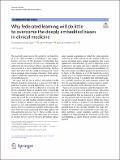| dc.contributor.author | Sauer, Christopher Martin | |
| dc.contributor.author | Pucher, Gernot | |
| dc.contributor.author | Celi, Leo Anthony | |
| dc.date.accessioned | 2024-06-10T19:39:48Z | |
| dc.date.available | 2024-06-10T19:39:48Z | |
| dc.date.issued | 2024-06-03 | |
| dc.identifier.issn | 0342-4642 | |
| dc.identifier.issn | 1432-1238 | |
| dc.identifier.uri | https://hdl.handle.net/1721.1/155222 | |
| dc.publisher | Springer Science and Business Media LLC | en_US |
| dc.relation.isversionof | 10.1007/s00134-024-07491-8 | en_US |
| dc.rights | Creative Commons Attribution | en_US |
| dc.rights.uri | https://creativecommons.org/licenses/by/4.0/ | en_US |
| dc.source | Springer Berlin Heidelberg | en_US |
| dc.title | Why federated learning will do little to overcome the deeply embedded biases in clinical medicine | en_US |
| dc.type | Article | en_US |
| dc.identifier.citation | Sauer, C.M., Pucher, G. & Celi, L.A. Why federated learning will do little to overcome the deeply embedded biases in clinical medicine. Intensive Care Med (2024). | en_US |
| dc.contributor.department | Harvard--MIT Program in Health Sciences and Technology. Laboratory for Computational Physiology | |
| dc.relation.journal | Intensive Care Medicine | en_US |
| dc.identifier.mitlicense | PUBLISHER_CC | |
| dc.eprint.version | Final published version | en_US |
| dc.type.uri | http://purl.org/eprint/type/JournalArticle | en_US |
| eprint.status | http://purl.org/eprint/status/NonPeerReviewed | en_US |
| dc.date.updated | 2024-06-09T03:10:46Z | |
| dc.language.rfc3066 | en | |
| dc.rights.holder | The Author(s) | |
| dspace.embargo.terms | N | |
| dspace.date.submission | 2024-06-09T03:10:45Z | |
| mit.license | PUBLISHER_CC | |
| mit.metadata.status | Authority Work and Publication Information Needed | en_US |
